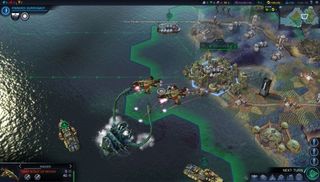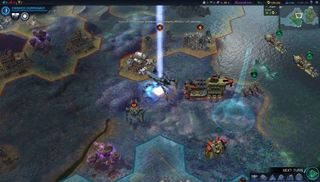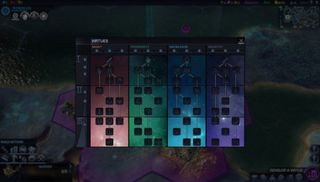Civilization: Beyond Earth hands-on: aliens ate my colony

Here's a tip: don't mess with aliens. I learned this the hard way in my Civilization: Beyond Earth demo, almost immediately after I made planetfall. The insect-like species that nested near my new colony seemed like simple adversaries, and I quickly mistook them for the barbarians of past Civ games. They were far, far worse.
I played two games of Beyond Earth to 100 turns at a recent Firaxis event, and both times I didn't give the indigenous life on my planets enough berth. They guarded the supply drops that I wanted, they destroyed trade convoys to neutral settlements, and they bombarded the improvements my worker units made. When I finally built up enough military might to try to eradicate them, my diplomatic partners accused me of genocide. Not that it mattered: my army was no match for the massive Siege Worms, ripped straight out of Frank Herbert's Dune.

Aliens are only one of Beyond Earth's additions, but they're a great example of why getting Civ off known soil is such a great idea. Firaxis is now free to experiment in ways that it simply couldn't in the confines of the more historical Civilization games. Previous entries to the series always had forward-looking technology in the endgame, but now that future tech marks the beginning of what your people can learn.
One hundred turns is not a long time in a Civ game, but I saw the benefits of this freedom very early on. Instead of learning archery or animal husbandry, my scientists researched how to recycle anything into energy, genetic splicing, and advanced robotics. Instead of club-wielding cavemen, my basic infantry wear power armor, and the next step up are mobile drones and laser-firing rangers. Sure, they all got demolished by the Siege Worm's horrific tentacles, but they looked good going down.

Research is now accomplished in the Tech Web, a sprawling system of technologies that ultimately dictate which of the game's three philosophical ideals, called Affinities, you follow. You start in the center of the web, but as you research further out, you'll push deeper into a specific Affinity path. Harmony civilizations seek to adapt to the planet's ecosystem, while Purity civs aim to preserve humanity as it was back on Earth. The most interesting is Supremacy, which ultimately seeks to merge humans with expanding technology and leads to bionic commandos and cybernetic wonders. The Tech Web is deep enough to reward long gameplay, but I get the sense that there won't be much of a moderate approach—you're best rewarded by picking a direction and researching down it.
I also saw the flexibility of Beyond Earth's virtue system, its take on Civilization V's social policy trees. After I had accrued enough Culture, I could unlock a new virtue in one of four trees. Might focuses on military strength, Prosperity includes bonuses for food production, Knowledge grants more research points, and Industry improves city production. Firaxis Marketing Manager Pete Murray tells me that many “experienced players” in Civ V would complete one Social Policy tree before moving on to the next, but Beyond Earth will reward players who stray between the different trees. Synergy bonuses (i.e. +10% research points, or a free covert ops unit) are awarded both horizontally and vertically in the virtue system, which means that your early perks might be better spent across two or three tiers instead of just one.

In practice, I found the virtue system to be more open-ended than social policies. I could push through the Knowledge tree to get as many research bonuses as possible, but I chose instead to take a Might perk early on for more experienced soldiers. I wasn't punished for spreading my points around, which encouraged me to experiment more.
PC Gamer Newsletter
Sign up to get the best content of the week, and great gaming deals, as picked by the editors.
There's a surprising amount to do in the first 100 turns. Most Civ entries have a standard, boring early game: explore with scouts, build up a military, skip a lot of turns as you research the basics. Beyond Earth adds decision points early on to help keep the beginning interesting. My Explorer units discover wrecked pods and artifacts that give me energy and production boosts. One pod contains transhuman wreckage survivors, and Beyond Earth gives me the option of integrating them in my society or sending them off on their own. It's one of many binary quests I receive in the early game. I let the freaky humans stay, hoping they'll convince my colony to adapt to the future.

With a standing army of soldiers, military rovers, and rangers ready to go, I finally decided to exact my revenge on the Siege Worms near the end of my second game. We surrounded the beast and took shots at it, but did minimal damage. Its retaliation was catastrophic: the beast devoured my soldiers in one attack, then made an angry beeline for my colony, crashing through farms and improvements in its rage. As I hit turn 100, the worm had reduced the homes of my space pilgrims to rubble, and the other factions in the game were chastising me for “provoking the native creatures.” Lesson learned: once Civilization: Beyond Earth is out on October 24, I'll befriend the aliens instead of trying to conquer them.
Most Popular

